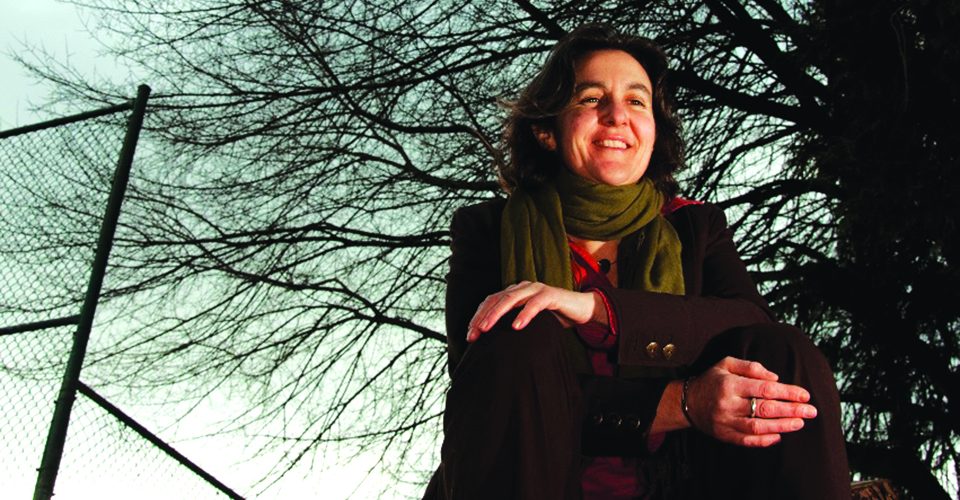RECENTLY LAUDED by the CBC as one of Anna Maria Tremonti’s “Game Changers,” Nicole Rycroft has been on an impassioned journey. Originally from Australia, this stalwart activist for environmental rights has gone from practising direct-action in blockades to sharing boardrooms with CEOs from some of Canada’s largest paper-consuming businesses.
RECENTLY LAUDED by the CBC as one of Anna Maria Tremonti’s “Game Changers,” Nicole Rycroft has been on an impassioned journey. Originally from Australia, this stalwart activist for environmental rights has gone from practising direct-action in blockades to sharing boardrooms with CEOs from some of Canada’s largest paper-consuming businesses.
Rycroft caught Can-lit lovers’ attention earlier this year when Canopy, her 12-year-old Vancouver-based forest protection non-profit, got Margaret Atwood on board. Atwood, along with her publisher at McClelland & Stewart, decided to print her newest title, In Other Worlds, on what Canopy has called Second Harvest paper, made from flax and straw left over after the grain harvest. “We rely almost exclusively in Canada on old-growth forests to provide the fibre for paper production,” says Rycroft. “If we really want to take the stress off forests, then we need to diversify the fibre basket.”
Cascades, a Quebec-based paper production company, worked with Canopy and produced the paper from straw pulp imported from China. (Although there is ample straw left over after the Canadian harvest, the country is not yet home to a pulping facility.) Julie Loyer, advisor for communication and sustainable development at Cascades Specialty Products Group, explains that Canopy approached Cascades with a proposal to make Second Harvest paper out of agricultural residues about a year ago.
Grey-flecked hair and funky thrift-store boots are not generally what marks an executive director of one of Canada’s most influential companies. But Nicole Rycroft is not your regular ED. Arrested in China for hanging from a banner during free Tibet protests in 2008, Rycroft has had what she calls a “circuitous” route to becoming the leader of a Canadian organization. A physiotherapist and national level athlete in lightweight rowing in Australia, Rycroft was halfway up Cat Face Mountain in the sleet and the snow during a 1998 protest in Clayoquot Sound when she found herself wondering whether she could achieve more far-reaching effects. “There is only so long that you can stand on a road and stop the destruction of specific groves of forests,” says Rycroft, who realized “there were many other forests around the world that were actually falling in that very same minute.”
Inspired by Martin Luther King and Burma’s Aung San Suu Kyi, Rycroft came to Canada in 1996 in a calculated move to have the most impact as an activist. “It felt like I was moving into the belly of the beast. North America consumes a lot of the world’s resources, and I felt that working as an activist here I could harness that voracious appetite for wood and paper products,” Rycroft explains from Canopy’s Toronto office, a tiny shared space at the Centre for Social Innovation. “North America is a hub for global consumption, and through that comes this ability to harness that purchasing power to drive positive change back through the supply chain.”
Raised in part by her grandmother, who bombarded her with nature documentaries, Rycroft was deeply impacted by the Australian bush. “It’s a very intense experience; it’s hot and with the heat, the oils of the eucalyptus and the tea tree kind of get released, so it’s very pungent,” she said. “It got woven into my fabric in a way that has instilled me with an appreciation and love of wild spaces.”
The connection between civil and environmental rights is instinctive for Rycroft. “I consider myself a social justice advocate,” she says. “A lot of the problems we are grappling with as a society are really based on a lack of respect for our fellow humanity and for the planet that we live on and the species that we share it with.” Rycroft hopes Canopy can contribute “to building a more compassionate society.”
As an activist, Rycroft had frustrating early experiences in Vancouver trying to make big forestry change. “I’d been in conversation with the forest companies and they’d said, ‘Well, honey that’s all very nice’ and ‘our customers need paper and this is the way that paper is produced’.” But Rycroft decided to work on more systemic change with “the actual market drivers of forest consumption.”
Canopy was originally named Markets Initiative. (She didn’t want to say, “I’m calling from tree-huggers anonymous!”) In its first year – 1999 – Rycroft got 21 companies to sign on to environmental policies, including Nike, The Body Shop and Mountain Equipment Co-op. Markets Initiative was then a one-woman show with an annual budget of $1800.
The following year, Rycroft zeroed in on publishing companies, getting 21 publishers to join the movement, including McClelland & Stewart, Random House Canada and Penguin Canada.
In 2001, Rycroft cold-called Alice Munro and suggested she might want to start printing her books on environmental paper. “Munro picked up the phone the very next day, called her publisher Doug Gibson – who’s a fabulous guy – at McClelland & Stewart and said, ‘Doug, I want my book on environmental paper,’ and literally the presses came to a screeching halt.” It wouldn’t be long before J.K. Rowling was also recruited, with Raincoast books printing Harry Potter and the Order of the Phoenix on ancient-forest-friendly paper in Canada in 2003, followed by the last two Potter books in 2005 and 2007.
Margaret Atwood’s latest book came out in October 2011, in a limited edition run on Second Harvest paper. Doug Pepper, president and publisher at McClelland & Stewart, says the company is quite happy with the results of the new paper stock. “Nicole and Canopy put a lot into developing it, and based on our past experience with them, I trusted they were onto a good thing,” Pepper says. “As a book publisher, we need to be open to taking risks when it comes to improving our environmental record.” M&S plans to print more titles on the paper when it becomes more commercially available.
As the market became more receptive to green business, the non-profit was renamed Canopy, but it is still rooted in the idea that the marketplace can drive positive environmental change. By starting with the forest industry’s largest customers, Rycroft aims to “have them develop and improve their own sustainability practices by virtue of their purchasing influence.”
The coming year promises a number of advances in that mission. Rycroft hopes to further partner with book publishers to produce a small series of special edition bestsellers on Second Harvest paper. Canopy is also working with two green entrepreneurs, including Prairie Pulp & Paper in Manitoba, to develop a Greenfield straw pulp facility. This, Rycroft says, is the “missing link” in Canada: A pulp facility could jumpstart the move from old-growth forest products to straw and agricultural-residue-based papers.
Having spearheaded conservation efforts in the Coastal Temperate Rainforest and the Boreal forest, Canopy has now joined rainforest conservation efforts in Indonesia.
“I really believe in the art of the possible,” Rycroft says. “I believe that you ask for what is needed.”
You can help Canopy build a business case for Second Harvest pulp and paper by purchasing its books (look for new releases this fall), and by completing its confidential market survey at Canopy Planet.
Anna Bowen is a freelance writer and editor based in Guelph, Ontario. More of her writing can be found at annabowen.org.













